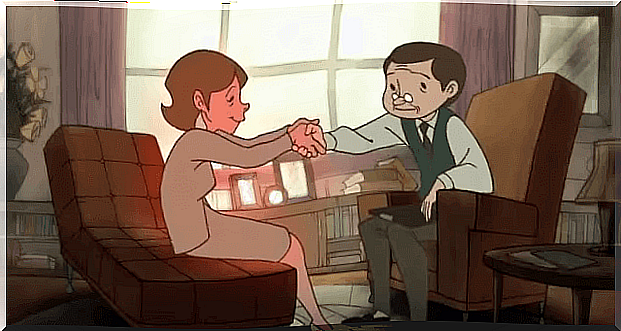Empathy Is The Thread With Which Therapy Is Woven

We have heard many times about empathy, its importance in social relationships, its powerful effects on communication with others, the need to incorporate it into our life as something indispensable in it. However, little we have heard about the weight that this occupies in a psychotherapeutic relationship and how without it the ship of therapy goes adrift. Far from his place in the world, he deviates against prognosis.
The therapist’s empathy towards his patient is as necessary and vital for his proper functioning as the air we breathe is for us. It is a good that cannot be dispensed with.
In therapy as in life, people are also lost
Of course, even while in therapy, the patient often feels lost. Feel that your life is going without a fixed course. Without a very powerful and visible light on which he can guide his steps. His journey begins to be groping between the darkness of the road and the small flashes of light that appear in its gutters.

The therapist can only accompany you on that path. That path that between circumstances and your will have chosen to learn the life lessons that will build you as a person. Many times there is a tendency to think that the work of a psychologist is to dislodge the person from that uncertain path in which they are: to facilitate the motivation to move away from the moments that they precisely have to live for the benefit of their own growth.
Life is sometimes uncertain and this is a reality that we have to assume
Walking through life in an uncertain way is natural and human. We shouldn’t be scared by it. Life is like a torrent of water that changes direction, but it always goes forward. It is like that stream of water that sometimes becomes a weak stream … but instead, other times after a good storm, it will regain the strength of bygone times.
Even the path a river travels is uncertain. His drive and blind trust in the flooding land are the driving force that keeps him on that wavering path. As changeable as our life.

Something similar happens in psychotherapy. The person will feel lost on many occasions. But it is very different to feel lost in company than to feel that way without someone’s support and support. The mere presence of the psychotherapist will not make the patient feel accompanied. The patient feels accompanied to the extent that the therapist returns each of the threads that he is sending. Having an empathetic attitude and respecting the patient’s rhythms is crucial in this process.
A nice metaphor about empathy
A few years ago I heard a beautiful metaphor about the accompaniment process in therapy. It was said by a grief psychologist whom I deeply appreciate and admire. He said that the patient, or the person who brings us their pain, is throwing a series of threads at us. Yes, like the threads of a skein of wool. He launches them at his own pace. Sometimes they take time to launch and others they do it suddenly.
The therapist picks up those threads that the patient throws at him, but far from leaving them aside, he returns each one of them with a self-made one. Little by little the threads are crossed and a loom is created. This personalized loom will be the one that will serve as a support and on which the patient can retreat in future occasions. The loom that both have created is a metaphor for what the therapeutic relationship is like.
Therapist and patient sail in the same boat
The therapeutic relationship cannot be understood without empathy. Empathy is that support, it is that wonderful loom, on which the therapeutic process advances. Every gesture, every emotion, every thought, every need is heard, understood and returned in a clearer, sharper and more appropriate way to the person in front of us.
The therapist is not sailing on a different ship. You are in the same boat as your patient. And they sail together. It accompanies you on this life-filled and uncertain journey.

If I do not return each of the threads that the patient sends me, I will not be able to build a relationship of trust and security with him. We will not be in tune and the patient, far from perceiving me as someone close, will end up perceiving me as a distant and blurred figure that he will not be able to trust and, even worse, he will not be able to feel free to be himself.
The therapist must also listen to what is not said in words
But to give back… you have to listen. You have to listen to our patient’s every movement. People speak in multiple and different languages. We speak with every part of our body without having to say a word through our mouth. You have to listen to each of these languages.
You have to master this wisdom that on many occasions we have not been taught either in career or in books. It is a much more subtle and intuitive language. We have to understand that the course of life also passes through these places and that is why we must remain in them together with our patient. Only in this way will we be able to hear and understand them.
Empathic understanding is essential in therapy
It is in this empathic understanding where the therapeutic relationship is configured. As Mariano Yela said in a length of a book by Carl Rogers and Marian Kinget:
“ The psychotherapist does not sanction, does not censor, does not judge the patient or act for him, does not indicate paths or close paths; He lives his conflicts and problems with him, striving to understand the personal meaning they have for the other. The patient does not find anything that separates him from himself or encourages him to mask himself ”.

The therapy process, therefore, is unique and personal. There are no standardized answer packages or universal techniques. Each person is unique in himself and we must always adjust to him. We have to accompany her on this journey that life entails. A journey in which we will assume that there will be certain moments and less certain, because after all …
What else is life?









